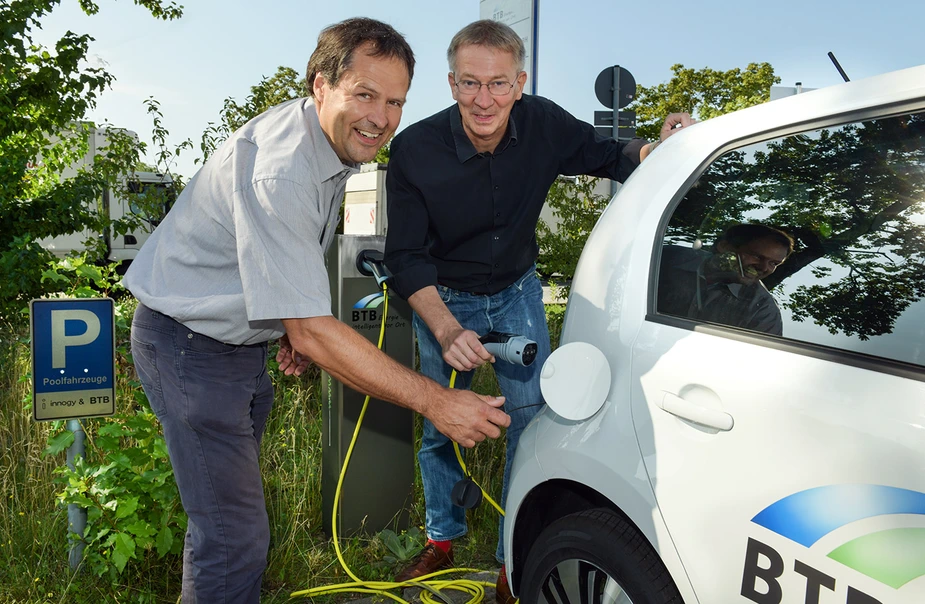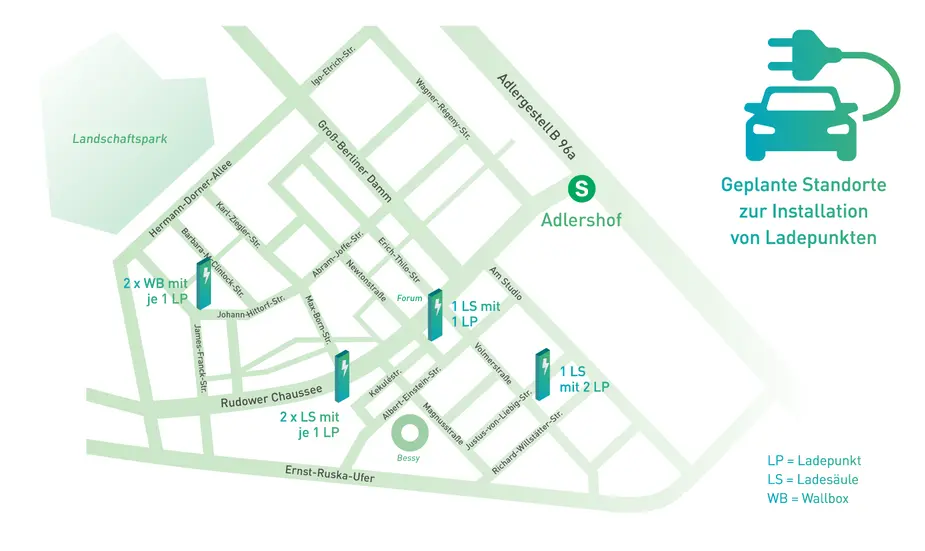Excess electricity for electric mobility
In the FlexNet4E-Mobility research project, strategies for more sustainable mobility are developed
When the power grid works at full capacity, electricity from renewable energy sources is cut back. In the FlexNet4E-Mobility project, a consortium of the Berlin-based energy provider BTB is developing strategies to better use that excess wind and solar-powered energy to charge electric vehicles. But the devil is in the details.
When we ask them, what it costs to charge an e-car, Johannes Hinrichsen and Holger Röntgen reply without hesitation: ‘About 10 euros. Based on today’s battery capacity.’ For customers, this great news. For providers of charging stations, however, this price is problematic. As long as electric vehicles are a niche product, investment into a charging infrastructure is a losing game. Some stations see an e-car every other day, which stops to charge for a few hours or parks for a few more. Many e-mobility users now simply charge their vehicles at home.
Is there a way to make this more feasible? Röntgen and Hinrichsen are addressing this question as the coordinators of the FlexNet4E-Mobility project on the part of the BTB Blockheizkraftwerks-Träger- und Betreibergesellschaft mbH Berlin, a local district heating provider. In cooperation with researchers from Technical University Berlin (TU), the BTB subsidiary Energienetze Berlin, WISTA Management GmbH, and the Austrian NEW ENERGY Capital Invest, they are exploring strategies for sustainable electromobility in Adlershof. Feasibility is the central issue and the project has one overarching aim: to charge electric cars with excess energy from renewable sources.
Excess energy that is currently not being produced when wind and solar energy providers cut back on production due to an overloaded grid. Using that energy to charge batteries seems like a natural choice. Set up in early 2017, the project has had to deal with a range of complex issues. It brings together analyses of demand for charging, parking infrastructure, Adlershof’s electricity grid, existing charging stations as well as the expansion of stations in parking garages and street lamps, with an analysis of the availability of excess electricity. ‘Based on time series und expansion scenarios, we know that the amount of excess electricity is limited. Compared with common charging profiles, we realise that there is only a 20 percent overlap with excess and charging times,’ says project head Röntgen.
With the aim of increasing that number to 20 or even 40 percent, the researchers are evaluating a range of approaches. Stationary batteries could store electricity. Managing people’s charging behaviour and smart regulation strategies could also prove effective. Excess energy is only available when the load in the grid is high. ‘Although it is desirable to use as much energy as possible to charge cars, this also puts additional pressure on the grid,’ says Hinrichsen, who is responsible for energy management at BTB. Simulations by TU researchers aim to clarify how regulation technology could help alleviate this contradiction and how much stationary buffer is needed to use excess electricity as efficiently as possible. Results are expected following the end of the project in late 2020.
Will any of this affect the everyday lives of people in Adlershof? ‘In cooperation with WISTA, we will set up seven charging stations at four different locations,’ says Röntgen. The project’s next step is to work out how simple 3.7 kWh charging stations, 22 kWh quick charge stations, and high-efficiency, constant-current chargers can work together. The latter are located at the BTB substation near the city motorway. However, the implementation of these measures depends on resolving the initial question. To make use of excess electricity on a larger scale, low-cost charging at charging stations must help refinance the stationary batteries. This might prove difficult. ‘We are now focusing on four locations that are easy to set up. Regarding all other issues, we will touch base with Adlershof-based companies who are interested in electromobility, or already operating electric vehicles,’ says Hinrichsen. If anybody reading this belongs to one of those two groups, they are cordially invited to take part in a workshop on the issue, which is being organised by BTB in cooperation with WISTA soon.
By Peter Trechow for Adlershof Journal

